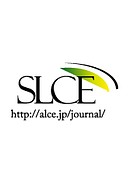Current issue
Displaying 1-21 of 21 articles from this issue
- |<
- <
- 1
- >
- >|
Special issue on Con_viviality in Language and Cultural Education
Editors' Introduction
-
Article type: Editors' Introduction
2023 Volume 21 Pages 1-5
Published: December 23, 2023
Released on J-STAGE: January 15, 2024
Download PDF (1531K)
Symposium
-
Article type: Symposium
2023 Volume 21 Pages 6-22
Published: December 23, 2023
Released on J-STAGE: January 15, 2024
Download PDF (2878K)
Forum
-
Article type: Forum
2023 Volume 21 Pages 23-31
Published: December 23, 2023
Released on J-STAGE: January 15, 2024
Download PDF (1069K)
Article
-
Article type: Article
2023 Volume 21 Pages 32-54
Published: December 23, 2023
Released on J-STAGE: January 15, 2024
Download PDF (1500K)
Regular Contents
Articles
-
Article type: Article
2023 Volume 21 Pages 55-73
Published: December 23, 2023
Released on J-STAGE: January 15, 2024
Download PDF (1260K) -
Article type: Article
2023 Volume 21 Pages 74-97
Published: December 23, 2023
Released on J-STAGE: January 15, 2024
Download PDF (1894K) -
Article type: Article
2023 Volume 21 Pages 98-110
Published: December 23, 2023
Released on J-STAGE: January 15, 2024
Download PDF (1207K) -
Article type: Article
2023 Volume 21 Pages 111-132
Published: December 23, 2023
Released on J-STAGE: January 15, 2024
Download PDF (1502K) -
Article type: Article
2023 Volume 21 Pages 133-152
Published: December 23, 2023
Released on J-STAGE: January 15, 2024
Download PDF (1497K) -
Article type: Article
2023 Volume 21 Pages 153-170
Published: December 23, 2023
Released on J-STAGE: January 15, 2024
Download PDF (1385K) -
Article type: Article
2023 Volume 21 Pages 171-184
Published: December 23, 2023
Released on J-STAGE: January 15, 2024
Download PDF (1804K) -
Article type: Article
2023 Volume 21 Pages 185-201
Published: December 23, 2023
Released on J-STAGE: January 15, 2024
Download PDF (903K) -
Article type: Article
2023 Volume 21 Pages 202-221
Published: December 23, 2023
Released on J-STAGE: January 15, 2024
Download PDF (1273K) -
Article type: Article
2023 Volume 21 Pages 222-240
Published: December 23, 2023
Released on J-STAGE: January 15, 2024
Download PDF (1165K) -
Article type: Article
2023 Volume 21 Pages 241-261
Published: December 23, 2023
Released on J-STAGE: January 15, 2024
Download PDF (1173K)
Forum
-
Article type: Forum
2023 Volume 21 Pages 262-277
Published: December 23, 2023
Released on J-STAGE: January 15, 2024
Download PDF (2002K) -
Article type: Forum
2023 Volume 21 Pages 278-296
Published: December 23, 2023
Released on J-STAGE: January 15, 2024
Download PDF (1440K) -
Article type: Forum
2023 Volume 21 Pages 297-302
Published: December 23, 2023
Released on J-STAGE: January 15, 2024
Download PDF (1194K) -
Article type: Forum
2023 Volume 21 Pages 303-321
Published: December 23, 2023
Released on J-STAGE: January 15, 2024
Download PDF (1222K)
-
2023 Volume 21 Pages 322-324
Published: December 23, 2023
Released on J-STAGE: January 15, 2024
Download PDF (1067K) -
2023 Volume 21 Pages 325-326
Published: December 23, 2023
Released on J-STAGE: January 15, 2024
Download PDF (280K)
- |<
- <
- 1
- >
- >|
